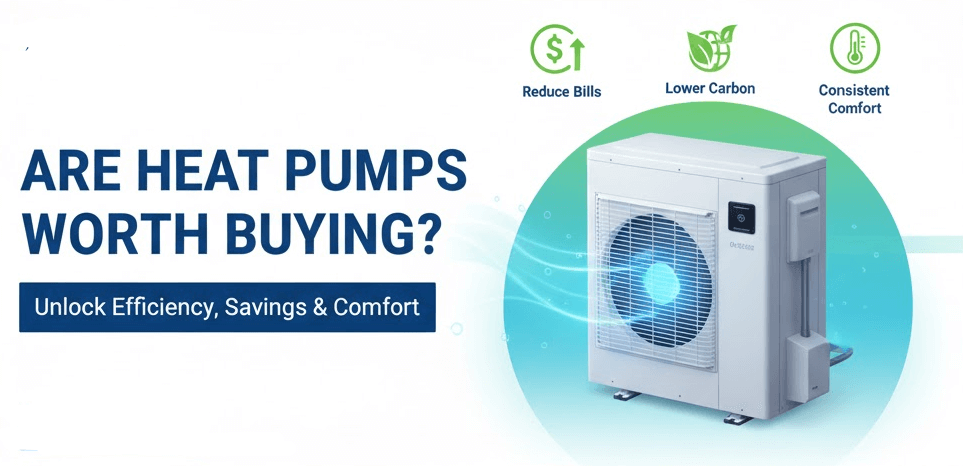Last Updated on 24 November 2025
Over recent years in Norfolk and East Anglia, energy prices have risen. Wholesale gas and oil costs, plus wider events, have pushed up energy bills. Traditional heating set-ups, such as gas boilers and oil boilers, can use much more energy. Many households now ask, “Are heat pumps worth it?” This guide explains how a heat pump works, likely running costs, grants such as the Boiler Upgrade Scheme, and what to check in your home.
Understanding air source heat pumps
Air source heat pumps capture low-grade heat from the outside air and upgrade it for space heating and hot water. An air source heat pump uses a closed loop with refrigerant gas, a compressor and a heat exchanger to move heat energy rather than burn fossil fuels. That is why heat pumps work at high efficiencies. In simple terms, a heat pump works by absorbing source heat from outside, compressing it to raise the temperature, passing it through a heat exchanger to warm water in your system, then releasing cooled refrigerant to absorb more air source heat. Modern heating systems pair well with underfloor heating, larger radiators, and a hot water cylinder.
Cost and practical considerations
Installation costs
The costs involved in installing a heat pump depend on property size, fabric and emitters. Typical installs range from £8,000 to £15,000. The UK Government supports low-carbon heating through the Boiler Upgrade Scheme (BUS), offering grants of £7,500 toward eligible heat pump installations.
Running costs
Typical running costs will vary by electricity tariff, property fabric and usage. Independent bodies such as Energy Saving Trust note that well-designed air source systems in well-insulated homes can be cost-effective compared with traditional boilers. If you want a simple rule, heat pump running costs improve when you reduce flow temperature, add smart controls and maximise efficiency with good emitters. Many three-bed homes see competitive annual costs, though your usage will differ.

System compatibility
A heat pump will connect to most wet heating systems. To work correctly, it often requires a larger surface area to release heat, which is why underfloor heating or larger radiators are helpful. You will usually need a hot water cylinder to provide hot water. Your installer will check pipework, electrical connections, available outdoor space, and whether planning rules apply. Most single outdoor units do not need planning permission, but always confirm.
Performance in winter
Modern air source heat pumps work in cold weather and can hold a set room temperature when sized and commissioned correctly. Defrost cycles are regular. In very low outdoor temperatures, the system will run longer at a steady rate, which is how heat pumps work best.
Alternatives
Ground source heat pumps use ground loops or boreholes to draw stable source heat from the earth with a thermal transfer fluid. Capital costs are higher, but seasonal efficiency can be excellent. Electric boilers remain simple but are usually less efficient and have higher running costs. Replacing a gas boiler like-for-like is familiar, yet traditional gas keeps you tied to the gas grid and ongoing fossil fuel heating systems.
Savings potential
When designed well, heat pumps can significantly reduce energy bills versus old gas and oil boilers. Many households switching from an older oil boiler or an aged gas boiler report lower annual spend and a smaller carbon footprint.
Grant funding
The Boiler Upgrade Scheme helps eligible homes switch from fossil fuels. The grant can reduce upfront cost, so getting a heat pump becomes competitive with a new boiler. Combined with fabric upgrades such as loft insulation and cavity wall insulation, you can maximise efficiency and improve comfort. The UK government supports low-carbon heating to meet national climate goals.
Environmental and financial benefits
Heat pumps cut carbon emissions because they move heat using electricity and avoid on-site combustion. As the grid adds more renewables, the carbon footprint of heat from a heat pump falls further. Financially, stable comfort, lower maintenance and smart controls add value over time. For businesses, cleaner heating helps ESG reporting and energy efficiency targets.
Is a heat pump right for your property?
Are heat pumps suitable for your home in Norfolk or East Anglia? In most existing homes, yes, provided the building is assessed. A survey will check insulation levels, radiator sizing, hot water demand, outdoor space for the unit and expected running costs. Older buildings can still work with a heat pump after sensible fabric upgrades.
Working together with solar and battery
Pairing a heat pump with solar panels and a solar battery can improve whole-home energy performance. Daytime generation can support space heating or hot water. Storing electricity helps cover evening demand and can reduce the need for imported energy. This set-up can further cut carbon emissions and energy bills.
What is the downside to a heat pump in the UK?
Common downsides include:
- Upfront cost, even with the Boiler Upgrade Scheme.
- Need for emitters suited to lower flow temperature, which may mean upgrading some radiators or adding underfloor heating.
- Space for the outdoor unit and a suitable hot water cylinder.
- Pay attention to design, commissioning, and controls so the heat pump works as intended.
What are the downsides of having a heat pump?
People sometimes worry about noise or winter performance. Quality air source heat pumps are quiet when sited well. In low-temperature weather, they run longer, not louder. Another downside is poor design. If the system is not sized correctly or if the home is not well insulated, you will not see the best energy results. Work with accredited installers who understand emitters, flow temperature, heat exchanger sizing and controls.
Why is my electric bill so high with an air source heat pump?
High bills usually point to one or more of these:
- The flow temperature is set too high, which reduces efficiency.
- Small radiators that limit heat output at low temperatures.
- Inadequate insulation, air leakage or high hot water demand.
- On-peak electricity use rather than using smart schedules.
- Ask your installer to check commissioning, weather compensation, and emitter balancing. Upgrading emitters, adding loft insulation or cavity wall insulation, and using smart timings for hot water can help. Many households see bills fall after these tweaks.
Why are heat pumps not the future?
Some say heat pumps are not the future because of high upfront costs or because certain homes still rely on gas. Yet the direction of travel is clear. Heat pumps already support UK climate goals and can be fitted in most homes. For some sites, a ground source option will be more suitable. For others, district heating or hybrid systems will play a role. There is no single answer for every property, but heat pumps are a proven, scalable solution today.
Air source vs ground source heat pumps
- Air source suits most homes. It is simpler to install and needs a modest outdoor space.
- Ground source heat pumps use stable ground temperature. They need trenches or boreholes and a circulating heated fluid with thermal transfer fluid. The capital cost is higher, but the efficiency can be excellent.
- Both options provide hot water and space heating when designed well.
Gas boilers, oil boilers and traditional heating systems
Replacing like-for-like gas boilers or an oil boiler feels familiar, but it continues reliance on fossil fuels and the gas grid. Traditional heating systems burn fuel on-site. A heat pump moves heat with electricity, avoiding combustion and cutting carbon emissions. That is why many households now aim to get a heat pump or plan to install a heat pump when their old boiler fails.
Tips to maximise efficiency
- Lower the flow temperature and use weather compensation.
- Fit suitable emitters such as underfloor heating or larger radiators.
- Improve fabric first, where possible. Loft insulation and cavity wall insulation help.
- Use smart controls for hot water schedules.
- Service the system so the heat pump works at its best.
Why choose Aspect
Aspect designs and installs heat pumps for homes and businesses across Norfolk and East Anglia. We survey your property, explain the costs involved, check emitters and electrical connections, and guide you through the Boiler Upgrade Scheme. Our team commissions your system so your heating and hot water run efficiently. We also support ground source projects and can integrate solar panels and batteries. If you want to get a heat pump or discuss installing a heat pump, we are ready to help.
Next steps
Thinking about a heat pump installed at your property. We can assess your current heating system, compare options with your gas or oil set-up, and estimate likely running costs. We will explain how a heat pump works, how it can heat water and rooms, and how to maximise efficiency. Contact Aspect to book a survey and see whether heat pumps are worth it for your home in Norfolk and East Anglia.


